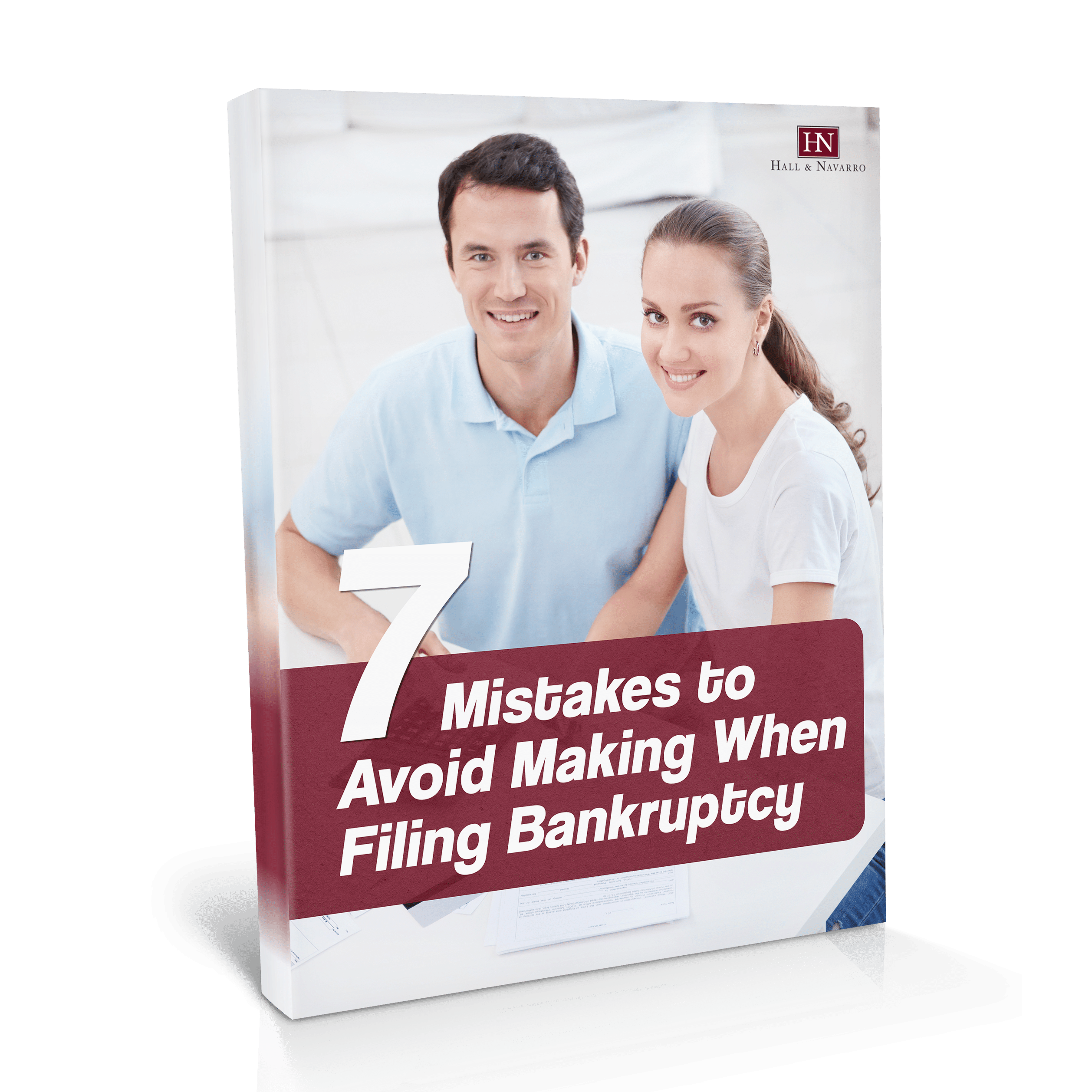Bankruptcy Attorneys

Chapter 7
Chapter 11
Chapter 12

Chapter 13
Georgia Bankruptcy Lawyers
Breathe Easy.
We’re With You.
The idea of filing for bankruptcy might be making you feel stressed out. There is a common misconception that bankruptcy is a bad thing. However, bankruptcy can be a useful tool to help you out of crippling debt.
We are for the people who need stability in the midst of the chaos of life, who need help when the road gets challenging.
Independent of other law firms, we believe in service that sees clients instead of case numbers, has an outstanding commitment to every client, and offers superior representation.
Let our family handle your family’s needs. Call the Georgia bankruptcy lawyers at Hall & Navarro today to get started.

Bankruptcy may be the best option.
Watch this video.
Top Rated Family Lawyers in Georgia
Over 100 5-star reviews on google









Considering bankruptcy?
Download our free guide.
There are 7 mistakes you should avoid when filing bankruptcy.

How is Hall & Navarro different?
Prepared to Win
No matter what, we approach every case prepared to win. This has been our driving force from day one, and still carries us forward today.
Breadth of Experience
With more than 75 years of combined experience in a variety of practice areas, we are frontrunners of law in Southeast Georgia.
Fearless representation
We put everything forward, and take nothing back. We are a united front, rallying behind and in front of every client.
Schedule your consultation.
Speak with one of our dedicated team members by filling out the form below.
More bankruptcy info
How Bankruptcy Works
Bankruptcy is designed for people who are so burdened by debt that they don’t have many other options. It offers a lot of benefits, as well as some consequences you should be aware of.
The most frequently utilized forms of bankruptcy are Chapter 13 and Chapter 7.
Chapter 13 requires a payment term of three to five years. In a Chapter 13, you have scheduled payments to the Chapter 13 trustee and typically payments to mortgage holders on residences. A Chapter 7 is normally advisable if you do not owe monies to secured creditors such as car loans, furniture loans or delinquencies on you home loan. Both bankruptcies are designed to help you get back on your feet.
When you file for bankruptcy, the companies to which you owe money are notified. The process is meant to be handled with the help of a skilled lawyer. You are essentially asking for some debts to be forgiven, rescheduled, or reduced. You will have your finances looked at closely and you will be going through a lot of paperwork.
Rebuilding credit after a bankruptcy
We have a lot of questions from our clients as to how you can rebuild credit after filing a bankruptcy. That is a very straightforward position. You have to incur debt in order to rebuild your credit. The first thing you might do is get a credit card, maybe it’s a secure credit card where you pay down and pay a deposit of $500 or so. Then, use the credit card up to a limit of $500. Something as simple as that helps to build your credit report. You could have a relative cosign with you on an automobile note and that, again, helps to rebuild your credit.
The main thing you’ve always got to think about in any sort of bankruptcy proceeding is that credit is what got you into trouble to start with. You want to be very judicious on how you reestablish your credit and how much you actually borrow, because the most important thing from any credit report is making timely payments.
Bankruptcy isn't life-ruining
There is a common misconception that if you have to file for bankruptcy, your life is over. That is simply misguided. Yes, there are things to consider before filing, but it is not going to ruin your life. It is intended to help you get your life back from debt.
You normally are able to keep your assets, and you may be able to keep your house, your car, and resolve some tax issues.
Try to reframe the way you think about bankruptcy. It is not meant to ruin your life or no one would ever file for it.
When you file, you are no longer going to be called by debt collectors all day every day. You won’t see them in your inbox anymore. What’s more, your assets may be protected through bankruptcy, meaning you keep your car and house, if you have those. Next, aside from family law, any litigation against you is ended. No more small claims court proceedings or garnishments.
Will people know I filed for bankruptcy?
The short answer is, yes, certain people will be able to look up your bankruptcy filing as a matter of public record. However, all bankruptcies are filed into a national database online where you must have a username and password approved by the court to log on and get access to those files. So, only certain people have access to this information.
Many clients are concerned about their employer finding out, their neighbors, their family members, and/or their ex-spouses. The bottom line is this: so long as those folks are not actually creditors or co-debtors of yours who will of course receive notice, it is unlikely that they will have access to the federal database. Therefore, they would not discover that you filed for bankruptcy.
Additionally, even if your employer were to find out, they cannot fire, demote, or transfer an employee for filing bankruptcy. This is considered discrimination. However, if you are actively seeking a job, private employers can allow a previous or pending bankruptcy to influence their hiring decision. Public employers, on the other hand, cannot.
